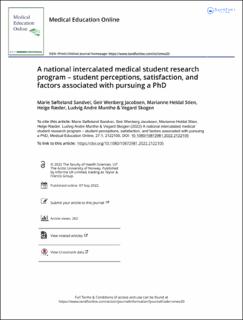A national intercalated medical student research program–student perceptions, satisfaction, and factors associated with pursuing a PhD
Sandvei, Marie Søfteland; Jacobsen, Geir Wenberg; Stien, Marianne Heldal; Ræder, Helge; Munthe, Ludvig Andre; Skogen, Vegard
Peer reviewed, Journal article
Published version

Åpne
Permanent lenke
https://hdl.handle.net/11250/3029032Utgivelsesdato
2022Metadata
Vis full innførselSamlinger
Sammendrag
Background
To counteract a decreasing number of physician-scientists, a national intercalated Medical Student Research Programme (MSRP) was launched in Norway in 2002. We aimed to assess whether the students’ favourable perceptions and satisfaction with the program had prevailed since the inception in 2002 and until 2015, and to identify factors associated with pursuing a PhD.
Methods
The study was an incorporation of data from two previous national evaluations of the MSRP performed in 2007 and 2015. We used electronic questionnaires to explore demographic characteristics, area and type of research, student satisfaction, and future scientific goals. In 2007, questionnaires were sent to all 208 students, and 183 (88%) replied. In 2015, the corresponding numbers were 279, and 240 (86%). Categorical data were analysed using either Kruskal-Wallis or Pearson’s chi square test. Differences between sample means were assessed with Student`s t-test while logistic regression was used to test associations between selected covariates and the students’ ambitions to pursue a PhD degree.
Results
Overall, the student satisfaction was 79%. However, more students in 2015 received less regular and less supervision time and expressed a need for more of it. Seventy-seven per cent expressed an ambition to pursue a PhD. Students were more likely to have a PhD ambition if they were satisfied with the program, had a supervisor with high expectations for them, or had already published some of their results. At both time points, students (86% vs. 89%) responded that the MSRP had a positive impact on their regular curriculum achievements.
Conclusions
The high degree of satisfaction with the national MSRP among undergraduate students has prevailed since the inception in 2002. By far, the program has also met its goal to increase the number of aspiring physician-scientists. However, to maintain that goal over time, adequate and personal supervision is a prerequisite.
